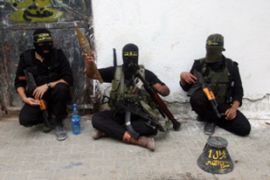Gaza awaits easing of Israeli siege
Palestinians dispute Israeli claim it is letting in more goods into enclave.

This would be up from about 60 lorries before the truce took hold last Thursday.
Israeli and Palestinian officials earlier said lorries passed through the Israeli-controlled Sufa border crossing into the Gaza Strip in the morning.
The goods were left there by the Israelis to be picked up in the afternoon by the Palestinians.
Israel refuses to deal directly with Hamas.
Israel imposed its siege of the territory a year ago after Hamas, the largest Palestinian armed group, seized total control when it pushed out security forces loyal to Mahmoud Abbas, the Palestinian president.
Hamas deployment
Hamas said on Sunday that it had deployed its security forces near Sufa “to prevent looting” and to ensure the goods are distributed in an orderly manner.
Palestinian officials could not immediately confirm the number of lorries entering the Gaza Strip on Sunday.
Officials on both sides have played down the immediate impact on humanitarian and economic conditions in the territory.
Raed Fattouh, who oversees the supply of goods to Gaza on behalf of Abbas’s government in the occupied West Bank, has questioned whether Israel is serious about easing the embargo.
While Israel has increased the number of lorries, it has not expand the range of goods allowed through the crossing, he said.
Kerem Shalom incident
Until April, Israel let an estimated 100 lorries every day through the border crossings of Kerem Shalom and Sufa.
They were blocked after fighters in Gaza attacked Kerem Shalom, causing heavy damage.
Since that attack, Kerem Shalom has been shut down and Gaza, home to 1.5 million people, has been receiving an estimated 60 lorryloads of supplies a day through Sufa, Lerner said.
Last week Israeli officials said that as a first the army would increase supplies by about 30 per cent over pre-truce levels.
Hamas officials said they expect Israel to expand nex week the range of goods allowed into the Gaza Strip, provided the ceasefire holds.
‘Heavy price’
Israeli mediators have made it clear that the reopening of the Rafah crossing with Egypt will depend on the fate of Gilad Shalit, the 21-year-old Israeli soldier seized by Palestinian fighters in a cross-border raid in June 2006.
Israel and Hamas are expected to renew indirect talks in Cairo on Tuesday on a prisoner exchange involving Shalit, according to a senior Israeli defence
official.
“Israel knows it will have to pay a heavy price for Shalit’s release and free many Palestinian terrorists,” the official, who asked not to be named, told the AFP news agency on Thursday.
The family of the captive Israeli soldier have asked Israel’s high court to delay the opening of border crossings with the Gaza Strip until he is released.
Shalit’s family petitioned the court late on Saturday to prevent the implementation of any agreement to open Gaza’s border crossings or to ease the economic blockade until Shalit “is freed from his captors or a guarantee for his release is given”.
A poll in the Yediot Ahronot newspaper on Friday said that 78 per cent of Israelis thought the truce agreement should have been made contingent on the release of Shalit.